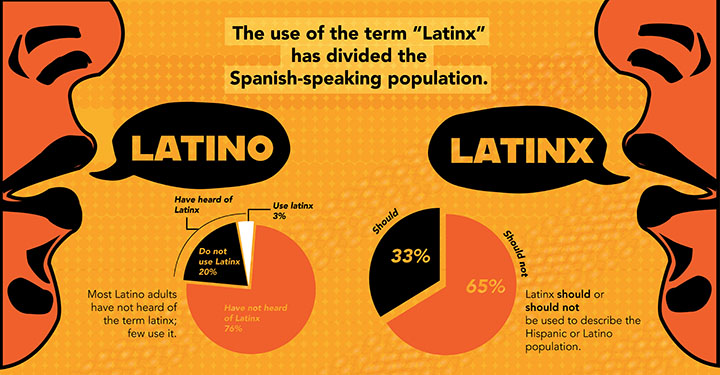Jose Romero
editor-in-chief
Hispanic heritage month is underway, and a common discussion among Hispanic circles is the usage of Latinx because it still has not been entirely accepted into the Spanish lexicon since only about 3% of Hispanics and Latinos use the word, according to Pew Research Center.
Oxford Languages defines Latinx — pronounced luh-TEE-neks — as a gender-neutral term used for people of Latin American origin or descent. Currently, the terms Latino and Latina are primarily used, but some prefer Latinx because it doesn’t leave anybody out.
“I like the word, and I do use it,” Connect student Lesley Rivera said. “I like it because it is inclusive to all genders, compared to the Spanish language which only uses feminine and masculine language.”
Lesley Rivera said a potential reason such a small percentage uses the term is that some may feel as if it’s being forced onto them. Cristina Rivera, president of NE Organization of Latin American Students, said another factor could be how new the word is.
About 76% of Latino adults, which is the masculine default identifier for all Hispanics, have not heard of the term, and 20% of those who have do not use it, according to Pew Research Center. Of the people who have heard of the term, 65% say it should not be used to describe the Hispanic or Latino population.
People need to work on the phobia they have with others who don’t identify as the sex assigned at birth, Lesley Rivera said.
“Incorrect pronouns are hurtful to this community, and when your own language doesn’t include LBGTQ+ pronouns, that’s another hurdle to jump over,” she said. “The more we use the word, Latinx, the more it becomes normalized.”
Lesley Rivera mentioned a common argument used against Latinx. She said some don’t like it because they feel as if white people are pushing their culture and language into theirs.
The history of the term isn’t definitive, but the most accepted theory of its origins comes from Latin American protests, according to David Bowles, Mexican-American author and professor at the University of Texas Rio Grande Valley. From the ‘70s to the ‘90s, feminists would put an “X” over the “OS” in Latinos as a way to reject the default masculine usage.
Cristina Rivera said she can sympathize with the struggle of people who identify as Latinx. She is from Brazil and said when she fills out an application and it doesn’t have an option for her to choose where she’s from, it makes her feel alienated.
“Language can be hurtful, and it is important to be respectful to the many communities that make up who we are,” NE ESL professor Mary Williams said.
Williams emphasized she isn’t a part of the Hispanic community and said she doesn’t want to draw conclusions without hearing the perspectives of those who do identify as Hispanic.
Cristina Rivera said people being divided by labels is not a good thing, and that people should show more love.
“Love and respect are the only things that don’t hurt anybody,” she said.

